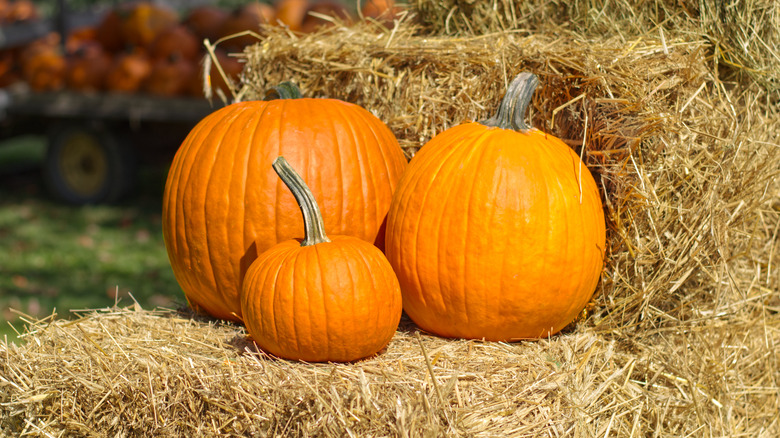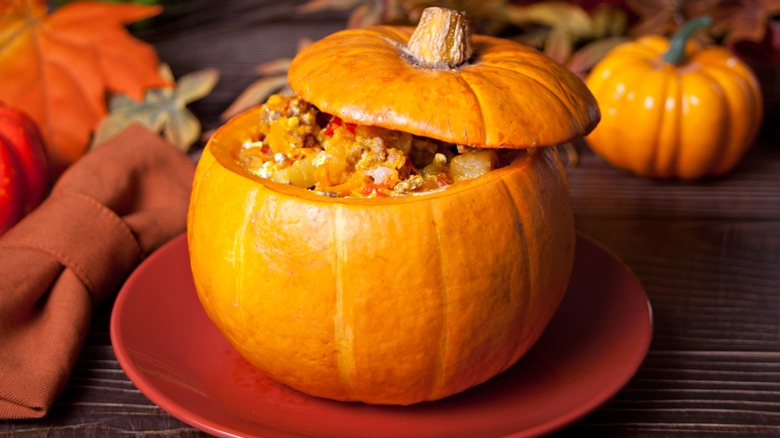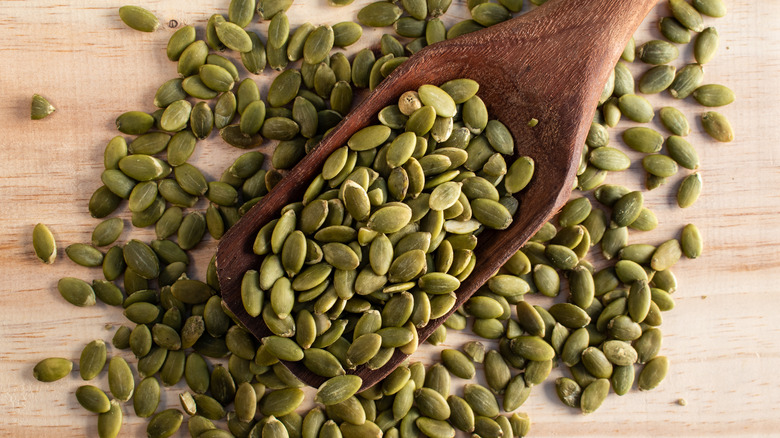The Health Benefits Of Eating Pumpkin
It's official: Pumpkin season is here. As soon as Starbucks brings their pumpkin spice latte back to the menu at the end of summer, it is only a matter a time before stores and restaurants everywhere begin unleashing their own pumpkin-flavored fall treats. But while autumn just wouldn't feel the same without pumpkin lattes, breads, and pies, it turns out, pumpkin is more than just a fall fad. The hard-shelled squash actually delivers quite a few health benefits, so you might just be right to load up your plate with pumpkin products this season.
Like its fellow winter squashes, the flesh of a pumpkin is not only edible, but is highly nutritious. For starters, the colorful squash contains a high amount of beta carotene, the same nutrient found in carrots that gives both vegetables their bright orange hue. The beta carotene, which the body converts into Vitamin A, can help keep your eyes healthy and help protect against cataracts and other degenerative eye diseases, especially as the body ages, according to Medical News Today. But that is not the only benefit that beta carotene delivers. This nutrient has also been linked to reduced risk of asthma, heart disease, and cancer, as well as improved muscle and bone health, per Fox News.
Pumpkins are loaded with vitamins and antioxidants
Beta carotene isn't the only healthy nutrient packed into pumpkins. Pumpkin also contains high amounts of Vitamins C and E, which can boost immunity and even improve skin health. Vitamin C helps boost the body's immune system, making pumpkin a great food to consume as the weather gets cooler and cold and flu season kicks into high gear. "Vitamin C aids neutrophils, a type of immune cell, in carrying out various immune functions such as getting rid of harmful bacteria," Mackenzie Burgess, a registered dietitian, explained to Fox News. Eating foods that are high in Vitamins C and E, and beta carotene have also been shown to have anti-inflammatory properties that can improve the health and appearance of skin, and protect against sun damage, according to Healthline.
Furthermore, pumpkins are a good source of potassium and fiber. Eating a diet high in fiber can help improve overall health by reducing the risk of high cholesterol and maintaining steady blood sugar levels, while potassium can lower blood pressure and support a healthy heart, according to Medical News Today.
Pumpkin seeds are a healthy snack
Pumpkin flesh is not the only healthy part of this autumn vegetable. Pumpkin seeds are also not only edible, they contain a fair amount of protein (about 7 grams per serving) as well as a healthy dose of iron and Omega-6 fatty acids, according to Healthline. A handful of these seeds also pack a powerful punch of antioxidants and nutrients like magnesium, zinc, riboflavin, and folate that have been linked to lowered risk of heart disease, cancer, and high blood pressure. So after you are done carving your Halloween pumpkin, you might want to consider roasting your seeds with a little salt for a healthy snack.
However, if you want to make the most of pumpkin's health benefits, you'll want to make sure that the pumpkin foods you eat are made with real pumpkin, and not just pumpkin pie spice flavoring, which contains no real pumpkin but tends to be added to foods that contain lots of sugar and very little real nutritional value, according to Second Harvest. Unfortunately, that means your pumpkin spice lattes probably aren't going to help boost your immunity and improve hearth health. But adding some real pumpkin to your diet this fall could definitely help give your health a real boost.


